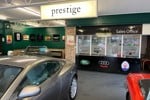By Philip Nothard
When CAP was preparing to launch a ‘total cost of motoring’ tool for consumers, we commissioned a piece of research into the attitudes of car buyers in today’s changed economy.
 |
||
|
Philip Nothard joined CAP in 2010 as its retail and consumer price editor, analysing pricing data and interpreting strategic market trends. In his role, he is able to apply two decades of experience gained in franchised motor retailers, which culminated in running dealerships for the likes of European Motor Holdings, Lythgoe Motor Group and Arnold Clark. |
||
The research was conducted for CAP by leading independent consumer research specialists HPI Research (www.hpiresearch.com), who interviewed 500 UK motorists, split equally between sexes and distributed evenly between the North, Midlands and South. The group was divided into four sub-groups:
‘Insulated’ – “I’m aware of problems in the wider economy but it has not affected me much.”
‘Cautious’ – “I’m just being more cautious about how much I spend and saving a bit more.”
‘Squeezed’ – “I’m taking action to buy cheaper brands and / or going to less expensive shops.”
‘Sufferers’ – “I’ve cut all expenditure that I can because I’m really worried about the future.”
All of them own a car and all, except the ‘insulated’, are actively saving money where they see an opportunity.
The survey results suggest dealers who are able to position their offering most effectively will gain an advantage over those who focus on transaction price alone. Examples of the findings include:
♦ One in two plan to buy a car that is cheaper to run, next time they change
♦ 84% say a clearer understanding of the total running costs of cars would influence their next purchase choice
♦ The top five factors they will consider, next time they change, are economy-related
♦ 30% regretted a previous car purchase on the grounds of overall running costs (this figure rises, the more recently they bought the car)
♦ 27% cite ‘not getting a good price’ for their current car is a barrier to buying another.
We are constantly told that consumers are more ‘savvy’ than ever, but, in reality, they are not. What consumers are now able to do is compare the advertised prices from dealers and then attempt to play them off against each other. They are also able to find a plethora of reviews and opinions about the qualities of cars they might buy.
But the HPI survey findings reveal a level of naivety when it comes to consumers’ understanding of the financial aspects of car ownership.
Dealers can take advantage of this by providing more information while, at the same time, diverting the customer from the blind belief that buying the car more cheaply than a similar one elsewhere will prove a wise financial choice.













Login to comment
Comments
No comments have been made yet.